Book contents
3 - From the People's Hall to the Wailing Wall
Published online by Cambridge University Press: 13 August 2009
Summary
Great humiliation never ends, said Auschwitz inmate Primo Levi, an authoritative witness to the subject, in The Reawakening. The memory of the offense engenders evil and hatred, which break the body and the spirit and mark both survivors and oppressors. This insight is, in a way, Primo Levi's legacy, expressed after his liberation from the death camp. The nature, effects, and functions of traumatic memory, especially memory of an immense human catastrophe such as the Holocaust, and more specifically the impact of this memory on the Israeli–Arab conflict, will be at the heart of this chapter. It deals with the mobilization of the memory of the Holocaust in the service of Israeli politics, beginning with the capture and trial of Adolf Eichmann in 1960–1962. A line is drawn from this event, and the specific Holocaust discourse it generated, to the Six Day War (June 1967) with its own existential Holocaust discourse.
Hence the cryptic title of the chapter which delineates its time frame: the People's Hall (in Hebrew, Bet Ha'am) was the site in Jerusalem where Israel held the trial of the Nazi criminal. The Wailing Wall (or Western Wall) of the title, which is considered a remnant of the outer wall of the Second Temple in Jerusalem, has become a national symbol and a major Jewish religious site.
- Type
- Chapter
- Information
- Israel's Holocaust and the Politics of Nationhood , pp. 91 - 127Publisher: Cambridge University PressPrint publication year: 2005



